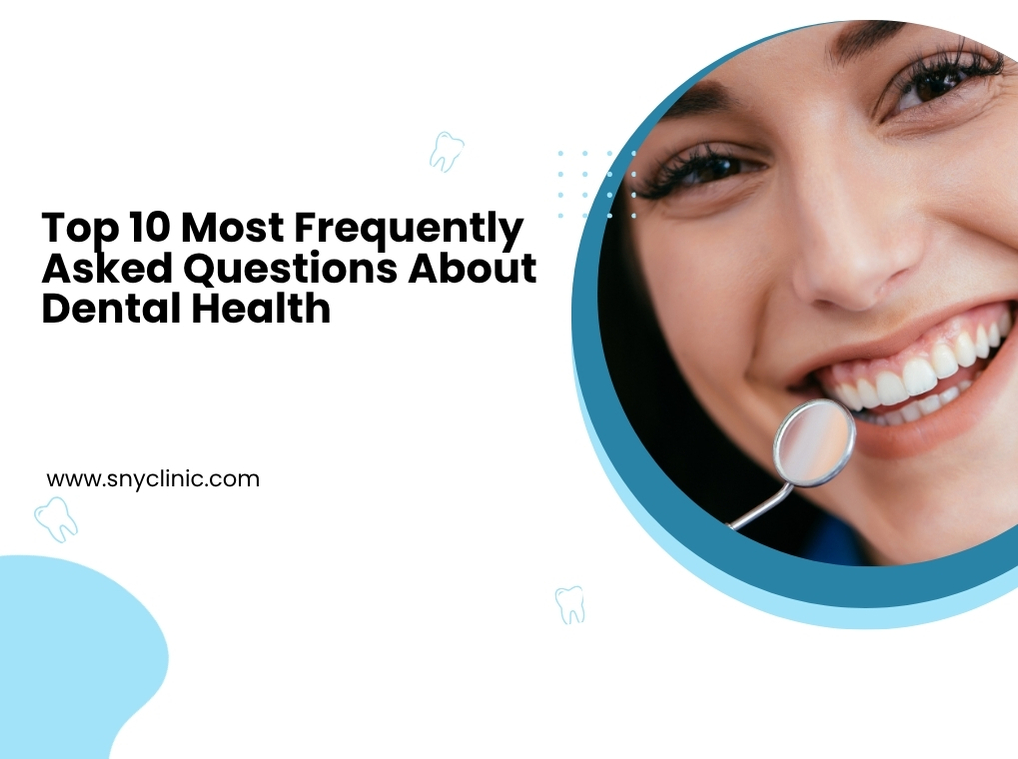
Top 10 Most Frequently Asked Questions About Dental Health
Top 10 Most Frequently Asked Questions About Dental Health
Oral and dental health are inseparable parts of our overall well-being. However, many people struggle to learn the right information about dental care or believe in misleading myths. In this article, we answer the 10 most frequently asked dental health questions from a dentist’s perspective.
1. How many times a day should I brush my teeth?
You should brush your teeth at least twice a day — after breakfast and before going to bed. If possible, it’s ideal to add a short brushing routine after lunch as well. When brushing, spend at least two minutes using a soft-bristled toothbrush and fluoride toothpaste. Avoid brushing too hard, as this can damage the enamel. Aim for gentle but effective cleaning.
2. Is using dental floss really necessary?
Yes, using dental floss is essential as a complement to brushing. Toothbrushes cannot reach the tight spaces between teeth. Plaque that builds up in these areas can lead to cavities and gum disease over time. Using dental floss or an interdental brush once a day — especially in the evening — helps protect your gums and prevent bad breath.
3. Is bad breath always caused by dental problems?
Bad breath (halitosis) is usually caused by bacteria in the mouth. However, stomach issues, tonsil infections, or sinus problems can also contribute. The most common causes include gum disease, tartar buildup, cavities, and poor oral hygiene. Regular dental cleanings and professional oral care can effectively eliminate this issue.
4. Does tartar cleaning damage the teeth?
No, tartar cleaning (scaling) does not damage your teeth. On the contrary, it helps protect your teeth and gums. If tartar is not removed for a long time, it can cause gum recession and bone loss. That’s why it is recommended to have a professional cleaning at least twice a year.
5. What causes bleeding gums?
The most common cause of bleeding gums is gum inflammation (gingivitis) and tartar buildup. Inadequate brushing, not using dental floss, and smoking can also make gums more sensitive. If you notice bleeding while brushing or flossing, it’s a warning sign — consult your dentist immediately.
6. Is teeth whitening harmful?
When done properly and under professional supervision, teeth whitening (bleaching) is not harmful. However, uncontrolled chemical whitening at home can cause enamel erosion and sensitivity. The safest methods are professional in-office whitening or dentist-approved take-home kits.
7. What causes tooth sensitivity?
Tooth sensitivity usually occurs due to enamel erosion or gum recession. You may feel sudden pain when eating cold, hot, sweet, or acidic foods. Special toothpastes for sensitivity, fluoride-based care products, and fluoride applications by your dentist can help relieve the problem.
8. Do I need a filling or a root canal?
If tooth decay is detected early, a filling is enough to restore the tooth. However, if the decay reaches the nerve, a root canal treatment may be necessary. Regular dental checkups help detect cavities early and make treatment easier and less invasive.
9. Do early loss of baby teeth affect permanent teeth?
Yes. Baby teeth serve as guides for the eruption of permanent teeth. Losing a baby tooth too early can cause misalignment or crowding. Therefore, if a child loses a baby tooth prematurely, your dentist may recommend using a space maintainer.
10. How often should I visit the dentist?
It is generally recommended to visit your dentist twice a year. During these visits, potential cavities, tartar buildup, or gum diseases can be detected early. Early diagnosis means simpler and more affordable treatment.
5 Golden Rules for Maintaining Dental Health
1. Brush your teeth twice a day for at least 2 minutes.
2. Use dental floss or an interdental brush daily.
3. Limit consumption of sugary and acidic foods.
4. Don’t neglect regular dental checkups.
5. Avoid smoking and tobacco products.
Getting accurate answers to your dental questions helps you maintain oral health and avoid unnecessary worries. Remember, healthy teeth are not only important for a beautiful smile but also for your overall health. With regular care, professional support, and good habits, you can enjoy a lifetime of healthy smiles.




